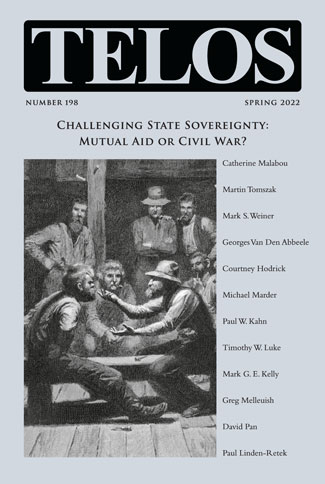In today’s episode of the Telos Press Podcast, David Pan talks with Georges Van Den Abbeele about his article “Can the Precariat Be Organized?: The Gig Economy, Worksite Dispersion, and the Challenge of Mutual Aid,” from Telos 198 (Spring 2022). An excerpt of the article appears here. In their conversation they discuss the history of the welfare state in the context of mutual aid, the idea of the “precariat” and how it relates to the idea of the working class and the question of mutual aid, and the new forms of mutual aid that are now possible with the rise of both the gig economy and new forms of social interaction. If your university has an online subscription to Telos, you can read the full article at the Telos Online website. For non-subscribers, learn how your university can begin a subscription to Telos at our library recommendation page. Print copies of Telos 198 are available for purchase in our online store.
|
Telos 198 (Spring 2022): Challenging State Sovereignty: Mutual Aid or Civil War? is now available for purchase in our store. Individual subscriptions to Telos are also available in both print and online formats.
In spite of this fragmentation, though, there are two main concerns that are shared. In the first place, there seems to be a general recognition among these different perspectives that the inhabitants of a state are not completely homogeneous and that the internal heterogeneity of a state should be at least in part the basis for domestic order. If libertarians prefer market-based structures and traditional conservatives look to family and religion, liberals seem to have gravitated toward identity-based groupings, and anarchists might prefer mutual aid organizations as independent places of sovereignty within which individuals can define themselves. The disagreements concern the type of heterogeneity that is being called for as well as the precise mechanisms for supporting diverse organizations within the state. |
||||
|
Telos Press Publishing · PO Box 811 · Candor, NY 13743 · Phone: 212-228-6479 Privacy Policy · Data Protection Copyright © 2025 Telos Press Publishing · All Rights Reserved |
||||



